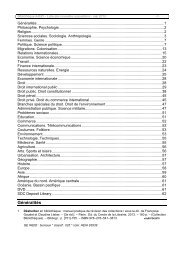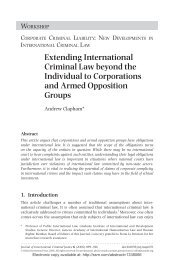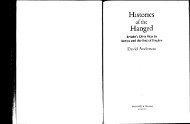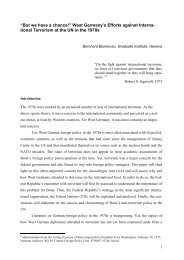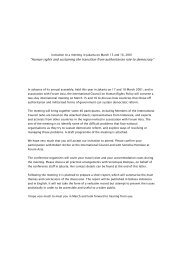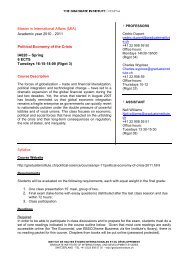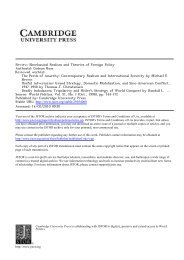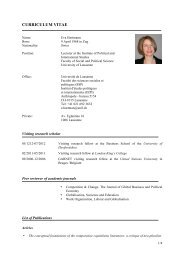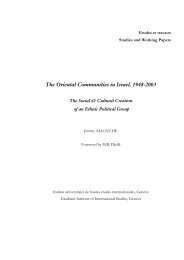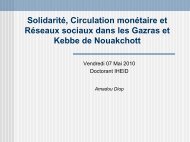Download - The Graduate Institute, Geneva
Download - The Graduate Institute, Geneva
Download - The Graduate Institute, Geneva
Create successful ePaper yourself
Turn your PDF publications into a flip-book with our unique Google optimized e-Paper software.
and fragments the normativity paradigm. 53 One can, thus, easily observe the<br />
ambiguities and inconsistencies in the way international organisations and doctrine<br />
alike 54 conceive the normative question with regard to diplomatic assurances.<br />
<strong>The</strong> inconclusiveness of the international community’s response to<br />
diplomatic assurances is all the more evident in the way international and domestic<br />
tribunals deal with the question of normativity. Before examining the relevant caselaw,<br />
a caveat might be useful. It has been persuasively argued 55 that judicial<br />
instances, when faced with an instrument of dubious normative nature, have the<br />
tendency to recast it into clear-cut legal language, into hard law. This is<br />
understandable, since more than anyone else judges are required to interpret every<br />
phenomenon through the legal prism. 56<br />
Having clarified that point, the attitude of international and domestic judicial<br />
instances towards diplomatic assurances against torture is incoherent. On the one<br />
hand, several judges have pronounced favourably on the question of diplomatic<br />
assurances’ obligatoriness. Both domestic and international tribunals have explicitly<br />
described assurances as having a binding nature. 57 It has been argued, however, that<br />
these pronouncements concerned diplomatic assurances against the imposition of<br />
death penalty, which differ crucially from those against torture. Assurances against<br />
death penalty, so the argument goes, are binding because the practice of death<br />
penalty is not illegal in the receiving State and therefore it is not surrounded by<br />
secrecy. Consequently, the implementation of these assurances can be easily<br />
controlled by the officials of the State of return and monitored by the sending State. 58<br />
sending State and that possible venues for an individual to assert its rights are limited; Noll, Gregor, op. cit.,<br />
note ??, at 119-123; see also “Empty Promises:” Diplomatic Assurances No Safeguard for Torture, Human Rights<br />
Watch, available at http://hrw.org/reports/2004/un0404/diplomatic0404.pdf, at 5.<br />
53<br />
See, Klabbers, Jan, Reflections on Soft International Law in a Privatized World, available at<br />
www.helsinki.fi/eci/Publications/JKSoft_law_and_public.pdf.<br />
54<br />
See, for example, Jones, Martin, Lies, Damned Lies and Diplomatic Assurances: <strong>The</strong> Misuse of Diplomatic<br />
Assurances in Removal Proceedings, 8 EUROPEAN JOURNAL OF MIGRATION AND LAW (2006), pp. 9-39, speaking<br />
about the paucity of remedies; Larsaeus, Nina, <strong>The</strong> Use of Diplomatic Assurances in the Prevention of Prohibited<br />
Treatment, RSC Working Paper No. 32, October 2006.<br />
55<br />
Klabbers, Jan, <strong>The</strong> Redundancy of Soft Law, 65 NORDIC JOURNAL OF INTERNATIONAL LAW (1996), pp. 167-182, at<br />
172 et seq.; Klabbers, Jan, An Introduction to International Institutional Law, 2002, Cambridge, CUP, at 340.<br />
56<br />
Cite Fouad.<br />
57<br />
Al-M. case, 2 BvR 1506/03, Constitutional Court of Germany (Bundesverfassungsgericht), order of the<br />
Second Senate of 5 November 2003, available at http://www.bundesverfassungsgericht.de/entscheidungen/<br />
rs20031105_2bvr150603en.html, §§21 and 76 (: <strong>The</strong> court stated that the reservations concerning the possible<br />
danger of torture had been removed by the assurance given by the United States, which was binding under<br />
international law); the decision was upheld – also in that point - by the ECtHR, Al-Moayad v. Germany, op. cit.,<br />
note ??, §69; see also Abu Salem v. Portugal, op. cit. Note ??, at 6 (:de telles assurances sont valuables et<br />
contraignants dans le cadre du respect du droit international).<br />
58<br />
See Suresh v. Minister of Citizenship and Immigration and Attorney General of Canada, judgment of 11 January<br />
2002, [2002] SCR 3, §§ 124. For a summary of the argument, see Nowak, Manfred and McArthur, Elizabeth, op.<br />
cit., note ??, at 217; Evans, Malcolm D., ‘All the Perfumes of Arabia’: <strong>The</strong> House of Lords and ‘Foreign Torture<br />
Evidence’, 19 LJIL (2006), σ. 1125-1144, at 1126; Walker, Clive, op. cit., note ??, at 443; Opinion on the International<br />
11


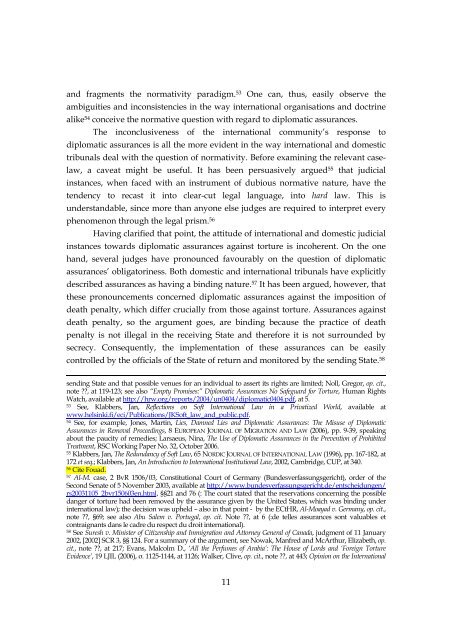
![Download [pdf] - The Graduate Institute, Geneva](https://img.yumpu.com/23370020/1/190x248/download-pdf-the-graduate-institute-geneva.jpg?quality=85)
